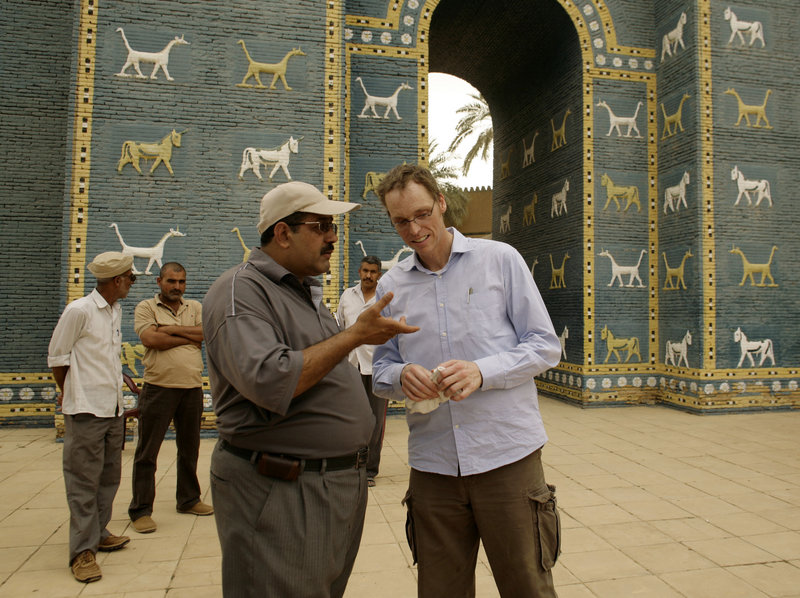BABYLON, Iraq – A U.S.-funded program to restore the ruins of Iraq’s ancient city of Babylon is threatened by a dispute among Iraqi officials over whether the priority should be preserving the site or making money off it.
Local officials want swift work done to restore the crumbling ruins and start building restaurants and gift shops to draw in tourists, while antiquities officials in Baghdad favor a more painstaking approach to avoid the gaudy restoration mistakes of the past.
The ruins of the millennia-old city, famed for its Hanging Gardens and the Tower of Babel, have suffered heavily over the past decades. Deep in Iraq’s verdant south, the cluster of excavated temples and palaces were mostly rebuilt by former ruler Saddam Hussein in the 1980s, using modern yellow brick to erect towering structures that marred the fragile remains of the original mud brick ruins. After Saddam’s fall in 2003, a U.S. military base on the site did further damage.
The site is filled with overgrown hillocks hiding the estimated 95 percent of the city that remains unexcavated and which archaeologists hope could eventually be uncovered.
But for that to happen, they argue, they need to train Iraqis in conservation methods and draw up a preservation plan that can be used to drum up international funds and get the site UNESCO World Heritage status.
A $700,000, two-year project to do that, funded by the U.S. State Department and carried out by the New York-based World Monument Fund, began last year and if it succeeds, the Babylon project could be a model for saving other ancient sites in this country that witnessed the birth of urban civilization.
“I’m optimistic, because what is happening in Babylon is the proper and scientific step and, God willing, the work in Babylon will open up new horizons,” said Qais Hussein Rashid, head of Iraq’s impoverished antiquities department.
Founded in the 3rd millennium B.C., Babylon rose to prominence nearly 4,000 years ago under King Hammurabi, whose famous law tablet resides in Paris’ Louvre Museum. In subsequent centuries the city was conquered, razed and rebuilt several times, becoming the largest city in the world with 250,000 inhabitants under King Nebuchadnezzar II in 600 B.C.
Nebuchadnezzar built the famed hanging gardens, one of the seven wonders of the world, for his homesick wife. He also exiled the Jewish people from Israel, gaining Babylon a bad rap in the Judeo-Christian tradition; the city’s name has since become synonymous with sin.
Given the state of the remains, the World Monument Fund is expanding its project, seeking up to $1 million from the U.S. to restore two monuments in urgent need of rescue: the 2,500-year-old Nabu-Sha-Khare temple and the remains of the monumental Ishtar Gate, once the main entrance to Nebuchadnezzar’s city.
Of all the battered ruins, the temple has the most potential, with its arched rooms and courtyards holding altars to the gods.
“This had the most original fabric,” explained Jeffrey Allen, a project coordinator. “It is a rare example of a fairly intact temple from the new Babylonian period.”
But plaster smeared over the mud-brick building in the 1980s is flaking away and in some places the weight of the modern materials has pulled down the ancient walls.
Babylon reopened to the public last year and receives a trickle of visitors, almost entirely locals. The site was a U.S. and the Polish military base until 2005, and a UNESCO report in 2009 slammed the military for damaging it with its heavy equipment.
Now that the surrounding area is secure, provincial officials are eager to have visitors — with their cash — coming to the site again. The governor of Babil province is pushing quick restoration and doesn’t want to wait for further study.
“We are not satisfied with the pace of the work in the site, which is being totally neglected by the antiquities board,” said Mansour al-Manae, a member of the provincial council and head of its archaeology and tourism committee.
Al-Manae called the site “a big source of money to the province and to the country.”
Copy the Story Link
Send questions/comments to the editors.



Success. Please wait for the page to reload. If the page does not reload within 5 seconds, please refresh the page.
Enter your email and password to access comments.
Hi, to comment on stories you must . This profile is in addition to your subscription and website login.
Already have a commenting profile? .
Invalid username/password.
Please check your email to confirm and complete your registration.
Only subscribers are eligible to post comments. Please subscribe or login first for digital access. Here’s why.
Use the form below to reset your password. When you've submitted your account email, we will send an email with a reset code.